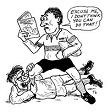1. A match lasts no longer than 80 minutes (split into two halves, each of not more than 40 minutes plus time lost), unless the match organiser has authorised the playing of extratime in a drawn match within a knock-out competition.
2. Half-time consists of an interval not exceeding 15 minutes as decided by the match organiser. During this time, the teams and match officials may leave the playing enclosure.
3. In non-international matches, the match organiser may decide to reduce the length of a match. If the match organiser does not decide, the teams agree on the length of a match. If they cannot agree, the referee decides.
4. The referee keeps the time but may delegate the duty to either or both assistant referees and/or an official time-keeper, in which case the referee signals to them any stoppage. In matches without an official time-keeper, if the referee is in doubt as to the correct time, the referee consults either or both the assistant referees and may consult others but only if the assistant referees cannot help.
5. The referee may stop play and allow time for :
a. Player injury for up to one minute. If a player is seriously injured, the referee has the discretion to allow more than one minute for that player to be removed from the playing area.
b. Consultation with other officials.
6. Once the ball is already dead, the referee may allow time for :
a. Replacement of players.
b. Replacing or repairing players’ clothing.
c. Re-tying a boot-lace.
d. Retrieving the ball.
7. A half ends when the ball becomes dead after time has expired unless :
a. A scrum, lineout or restart kick following a try or touchdown, awarded before time expired, has not been completed and the ball has not returned to open play. This includes when the scrum, lineout or restart kick is taken incorrectly.
b. The referee awards a free-kick or penalty.
c. A penalty is kicked directly to touch without the ball first being tapped and without the ball touching another player.
d. A try has been scored, in which case the referee allows time for the conversion to be taken.
8. A team scoring a try may attempt the conversion or may decline it.
a. The decision to decline the conversion must be relayed by the try scorer to the referee by saying “no kick” after the try is awarded.
b. Provided the conversion is attempted or declined before time elapses, the referee will award a restart kick.
c. If the conversion is attempted, time is taken from the strike on the ball.
9. When weather conditions are exceptionally hot and/or humid, the referee has the discretion to allow for a water break. This one-minute break should be taken midway through the half, after a score or when the ball is dead near the half-way line.
10. The referee has the power to end or suspend the match at any time if the referee believes that it would be unsafe to continue.
- 19 weergaves
